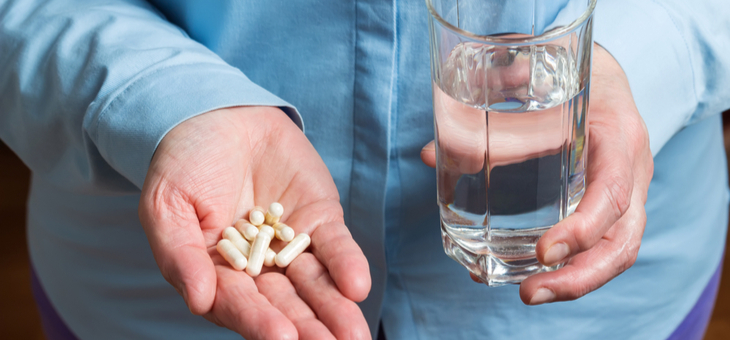Professor Dana King is cautious but excited about a supplement that “may reduce overall mortality”.
To date, the only reliable ways to improve your odds of remaining healthy and living longer are to eat well, exercise and get lucky. So, when it’s suggested you can swallow something to reduce mortality, it pays to be sceptical.
That said, here’s the news on glucosamine: “Glucosamine supplements may reduce overall mortality about as well as regular exercise does, according to a new epidemiological study from West Virginia University.”
Does that mean you can swap the exercise for a glucosamine pill?
“That’s not what we suggest,” says study author Prof. King. “Keep exercising, but the thought that taking a pill would also be beneficial is intriguing.”
After assessing data from 16,686 adults who completed the US National Health and Nutrition Examination Survey from 1999 to 2010, the researchers found taking glucosamine/chondroitin every day for a year or longer was associated with a 39 per cent reduction in all-cause mortality.
It was also linked to a 65 per cent reduction in cardiovascular-related deaths. That includes deaths from stroke, coronary artery disease and heart disease.
“Once we took everything into account, the impact was pretty significant,” Prof. King said.
Yahoo Sports defines glucosamine and chondroitin as “naturally-occurring substances found in cartilage. The two compounds are often combined in over-the-counter supplements that are marketed to ease joint pain or osteoarthritis”.
Glucosamine used for supplements is harvested from the shells of shellfish or synthesised in a laboratory.
“Glucosamine is known to inhibit inflammation to relieve pain, which is why so many people find it helpful for painful joints,” said Dr Sarah Brewer, medical director of Healthspan.
“It’s possible this reduced inflammation also protects against cardiovascular and other chronic diseases.”
Recent studies had not demonstrated the two supplements were all that useful in treating arthritis pain, yet the West Virginia study found “regular consumption of glucosamine/chondroitin seems to be significantly associated with lower overall and cardiovascular mortality”.
Its authors noted that additional research was necessary to confirm their findings.
Prof. King explains that because this is an epidemiological study – rather than a clinical trial – it doesn’t offer definitive proof that glucosamine/chondroitin makes death less likely. But he does call the results encouraging.
“In my view, it’s important that people know about this, so they can discuss the findings with their doctor and make an informed choice. Glucosamine is over the counter, so it is readily available,” he said.
Prof. King started taking the supplement “for arthritis and cycling”.
“I’m in a local cyclists’ club, and we go for rides on weekends,” he said.
“One day I asked the other cyclists if they took glucosamine, and everyone did. And I thought, ‘Well, I wonder if this is really helpful?’ That’s how I got curious about it.”
Discussing a 2014 study of glucosamine in mice, Professor Michael Ristow, of the Department of Health Sciences and Technology, ETH Zurich, said there was no definite proof of the effectiveness of glucosamine in humans.
“But the chances are good, and since unlike with most other potentially lifespan-extending drugs there are no known relevant side-effects of glucosamine supplementation, I would tend to recommend this supplement.”
Even if you take glucosamine, fitness cannot be ignored. The World Health Organization (WHO) recently updated activity guidelines for an increasingly sedentary humanity.
The WHO now recommends adults should do at least 150 to 300 minutes of moderate-intensity aerobic activity or 75 minutes per week of vigorous aerobic activity or a combination of both. They should also do strengthening activities that involve all the major muscle groups at least two days a week.
The University of Southern Queensland’s Professor Stuart Biddle was one of 27 experts worldwide who updated the guidelines, aimed to address the world’s physical inactivity health crisis and an impending ‘tsunami’ of obesity and diet-related disease.
The most notable change to the guidelines is that an aerobic activity no longer needs to last at least 10 minutes to be beneficial.
“This is great news because it means every little bit of exercise you do now counts,” Prof. Biddle said.
“This might encourage people to start parking their car further away in the car park to get in more steps, take the stairs instead of the lift, or walk to a colleague’s desk instead of emailing them.”
The guidelines show that moving more and sitting less is key to keeping physically and mentally fit.
“It doesn’t mean you need to join a gym or invest in some expensive equipment,” Prof. Biddle said.
“Any type of activity that raises your heart rate and helps build muscle strength is fine.
“Our lives depend on us moving more.”
Are you interested in taking glucosamine? Have you taken glucosamine for arthritis pain?
If you enjoy our content, don’t keep it to yourself. Share our free eNews with your friends and encourage them to sign up.
Related articles:
https://www.yourlifechoices.com.au/health/your-health/best-and-worst-supplements
https://www.yourlifechoices.com.au/health/wellbeing/nutrition/brain-supplements-that-really-work
https://www.yourlifechoices.com.au/health/wellbeing/relationships/sexdrive-supplements-for-women

